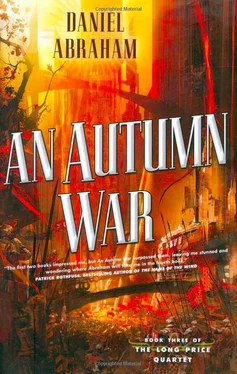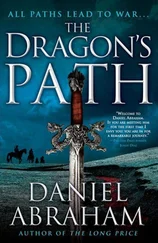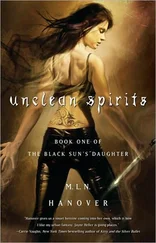Daniel Abraham - Autumn War
Здесь есть возможность читать онлайн «Daniel Abraham - Autumn War» весь текст электронной книги совершенно бесплатно (целиком полную версию без сокращений). В некоторых случаях можно слушать аудио, скачать через торрент в формате fb2 и присутствует краткое содержание. Жанр: Фэнтези, на английском языке. Описание произведения, (предисловие) а так же отзывы посетителей доступны на портале библиотеки ЛибКат.
- Название:Autumn War
- Автор:
- Жанр:
- Год:неизвестен
- ISBN:нет данных
- Рейтинг книги:4 / 5. Голосов: 1
-
Избранное:Добавить в избранное
- Отзывы:
-
Ваша оценка:
- 80
- 1
- 2
- 3
- 4
- 5
Autumn War: краткое содержание, описание и аннотация
Предлагаем к чтению аннотацию, описание, краткое содержание или предисловие (зависит от того, что написал сам автор книги «Autumn War»). Если вы не нашли необходимую информацию о книге — напишите в комментариях, мы постараемся отыскать её.
Autumn War — читать онлайн бесплатно полную книгу (весь текст) целиком
Ниже представлен текст книги, разбитый по страницам. Система сохранения места последней прочитанной страницы, позволяет с удобством читать онлайн бесплатно книгу «Autumn War», без необходимости каждый раз заново искать на чём Вы остановились. Поставьте закладку, и сможете в любой момент перейти на страницу, на которой закончили чтение.
Интервал:
Закладка:
"Well," he said, settling his paunch more comfortably in the library's deep silk-covered chair, "as it happens, his binding did fail. It was tragic. He started screaming, and didn't stop for hours. He stopped when he died, of course, and when they examined him afterwards, they found slivers of glass all through his blood."
"They cut him open?"
"Of course," Maati said.
"That's disgusting," she said. "l'hen a moment later, "If someone died here, could I help do it?"
"No one's likely to try a binding here, Eiah-kya. Only poets who've trained for years with the I)ai-kvo are allowed to make the attempt, and even then they're under strict supervision. Holding the andat is dangerous work, and not just if it fails."
"'T'hey should let girls do it too," she said. "I want to go to the school and train to he a poet."
"But then you wouldn't he your father's daughter anymore. If the I)ai-kvo didn't choose you, you'd he one of the branded, and they'd turn you out into the world to make whatever way you could without anyone to help you."
"That's not true. Father was at the school, and he didn't have to take the brand. If the Dai-kvo didn't pick me, I wouldn't take it either. I'd just come back here and live alone like you do."
"But then wouldn't you and I)anat have to fight?"
"No," Eiah said, taking a pose appropriate to a tutor offering correction. "Girls can't be Khai, so Danat wouldn't have to fight me for the chair."
"But if you're going to have women be poets, why not Khaiem too?"
"Because who'd want to he Khai?" she asked and took another piece of cake from the tray on the table between them.
The library stretched out around them-chamber after chamber of scrolls and books and codices that were Maati's private domain. The air was rich with the scent of old leather and dust and the pungent herbs he used to keep the mice and insects away. Baarath, the chief librarian and Maati's best friend here in the far, cold North, had kept it before him. Often when Maati arrived in the morning or remained long after dark, puzzling over some piece of ancient text or obscure reference, he would look up, half-wondering where the annoying, fat, boisterous, petty little man had gotten to, and then he would remember.
The fever had taken dozens of people that year. Winter always changed the city, the cold driving them deep into the tunnels and hidden chambers below Machi. For months they lived by firelight and in darkness. By midwinter, the air itself could seem thick and stifling. And illnesses spread easily in the dark and close, and Baraath had grown ill and died, one man among many. Now he was only memory and ash. Maati was the master of the library, appointed by his old friend and enemy and companion Otah Machi. The Khai Machi, husband of Kiyan, and father to this almost-woman Eiah who shared his almond cakes, and to her brother Danat. And, perhaps, to one other.
"Maati-kya? Are you okay?"
"I was just wondering how your brother was," he said.
"Better. He's hardly coughing at all anymore. Everyone's saying he has weak lungs, but I was just as sick when I was young, and I'm just fine."
"People tell stories," Maati said. "It keeps them amused, I suppose."
"What would happen if Danat died?"
"Your father would be expected to take a new, younger wife and produce a son to take his place. More than one, if he could. "That's part of why the utkhaiem are so worried about Danat. If he died and no brothers were forthcoming, it would be had for the city. All the most powerful houses would start fighting over who would be the new Khai. People would probably be killed."
"Well, Danat won't die," Eiah said. "So it doesn't matter. Did you know him?"
"Who?"
"My real uncle. Danat. The one Danat's named for?"
"No," Maati said. "Not really. I met him once."
"Did you like him?"
Maati tried to remember what it had been like, all those years ago. The Dai-kvo had summoned him. That had been the old Dai-kvo- "Iahi-kvo. He'd never met the new one. 'Iahi-kvo had brought him to meet the two men, and set him the task that had ended with Otah on the chair and himself living in the court of Machi. It had been a different lifetime.
"I don't recall liking him or disliking him," Maati said. "He was just a man I'd met."
Eiah sighed impatiently.
"Tell me about another one," she said.
"Well. There was a poet in the First Empire before people understood that andat were harder and harder to capture each time they escaped. He tried to bind Softness with the same binding another poet had used a generation before. Of course it didn't work."
"Because a new binding has to be different," Isiah said.
"But he didn't know that."
"What happened to him?"
"His joints all froze in place. He was alive, but like a statue. He couldn't move at all."
"How did he cat?"
"He didn't. They tried to give him water by forcing it up his nostrils, and he drowned on it. When they examined his body, all the bones were fused together as if they had never been separate at all. It looked like one single thing."
"That's disgusting," she said. It was something she often said. Maati grinned.
They talked for another half a hand, Maati telling tales of failed bindings, of the prices paid by poets of old who had attempted the greatest trick in the world and fallen short. Eiah listened and passed her own certain judgment. They finished the last of the almond cakes and called a servant girl in to carry the plates away. Eiah left just as the sun peeked out between the low clouds and the high peaks in the west, brightness flaring gold for a long moment before the city fell into its long twilight. Alone again, Nlaati told himself that the darkness was only about the accidents of sunlight, and not his young friend's absence.
He could still remember the first time he'd seen Eiah. She'd been tiny, a small, curious helplessness in her mother's arms, and he had been deeply in disfavor with the Dai-kvo and sent to Machi in half-exile for treading too near the line between the poets and the politics of the court. The poets were creatures of the Dai-kvo, lent to the Khaiem. The Dai-kvo took no part in the courtly dramas of generational fratricide. The Khaiem supported the Dai-kvo and his village, sent their excess sons to the school from which they might be plucked to take the honor of the brown robes, and saw to the administration of the cities whose names they took as their own. The Khai Machi, the Khai Yalakeht, the Khai "Ian-Sadar. All of them had been other men once, before their fathers had died or become too feeble to rule. All of them had killed their own brothers on the way to claiming their positions. All except Utah.
Otah, the exception.
A scratching at the door roused Maati, and he hauled himself from his chair and went forward. The night had nearly fallen, but torches spattered the darkness with circles of light. Even before he reached the door, he heard music coming from one of the pavilions nearby, the young men and women of the utkhaiem boiling up from the winter earth and celebrating nightly, undeterred by chill or rain or heartbreak. And at the door of his library were two familiar figures, and a third that was only expected. Cehmai, poet of Machi, stood with a bottle of wine in each hand, and behind him the hulking, bemused, inhuman andat Stone-Made-Soft raised its wide chin in greeting. The other-a slender young man in the same brown robes that Cehmai and Maati himself wore-spoke to Cehmai. Athai Vauudun, the envoy from the Dai-kvo.
"He is the most arrogant man I have ever met," the envoy said to Cehmai, continuing a previous conversation. "He has no allies, only one son, and no pause at all at the prospect of alienating every other city of the Khaiem. I think he's proud to ignore tradition."
"Our guest has met with the Khai," Stone-Made-Soft said, its voice low and rough as a landslide. "They don't appear to have impressed each other favorably."
Читать дальшеИнтервал:
Закладка:
Похожие книги на «Autumn War»
Представляем Вашему вниманию похожие книги на «Autumn War» списком для выбора. Мы отобрали схожую по названию и смыслу литературу в надежде предоставить читателям больше вариантов отыскать новые, интересные, ещё непрочитанные произведения.
Обсуждение, отзывы о книге «Autumn War» и просто собственные мнения читателей. Оставьте ваши комментарии, напишите, что Вы думаете о произведении, его смысле или главных героях. Укажите что конкретно понравилось, а что нет, и почему Вы так считаете.










